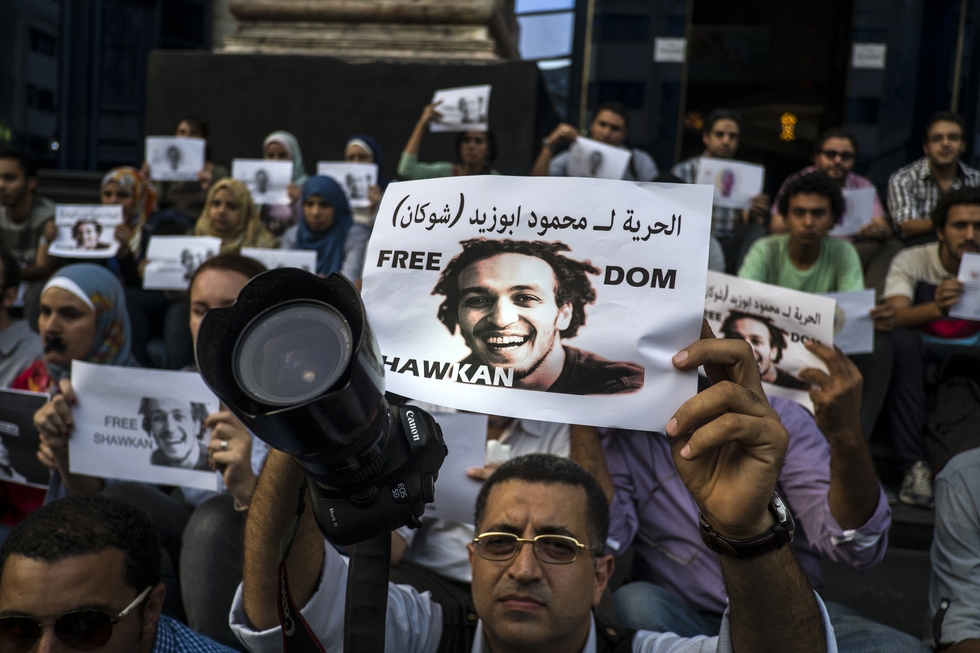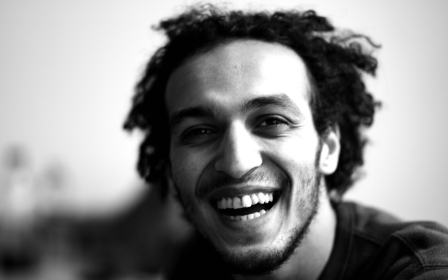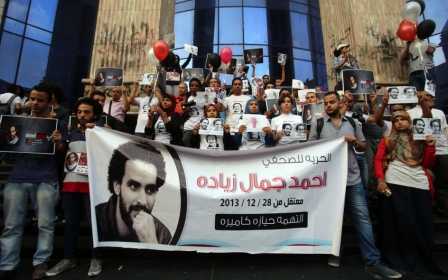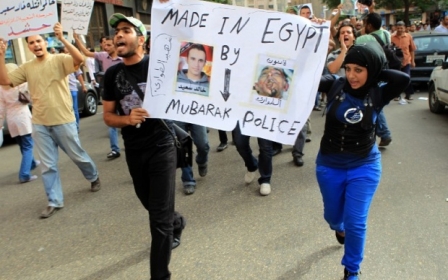Egyptian photojournalist appears in court after 850 days held without charge

Egyptian photojournalist Mahmoud Abou Zeid, better known as Shawkan, appeared in court on Saturday for the first time after more than 850 days of being detained without charge.
The Cairo Criminal Court adjourned the photojournalist’s trial to 6 February, citing lack of space in the dock for hundreds of defendants in the case, the “Freedom for Shawkan” campaign reported.
At least 739 defendants are being tried in the same case as Shawkan, referred to as the “Rabaa sit-in dispersal” on 14 August 2013. Rabaa Square had amassed thousands of pro-Muslim Brotherhood supporters and other anti-military activists following the ousting of former Egyptian president Mohamed Morsi a month earlier on 3 July by a popularly-backed military coup.
The “dispersal” involved hundreds of heavily armed security officers dispatched to the square. By the end of the day, more than 800 were killed.
The defendants face charges of affiliations with the banned Muslim Brotherhood group, assembly, murder, weapon possession and deliberately damaging of public and private assets.
Shawkan had arrived to the square around 9am on assignment and was immediately arrested after identifying himself to the police as a journalist. He says he was beaten and thrown into a police van, and for the last two and a half years he has been held in the maximum security Torah prison complex just outside Cairo.
Many lawyers and human rights defendants have described his ongoing incarceration as unlawful because the maximum pre-trial detention in Egyptian is two years.
According to a statement released by Amnesty International on Thursday, Shawkan risks life imprisonment on “trumped up and politically motivated charges stemming from his work”.
“Amnesty International has repeatedly expressed its concern over the Egyptian authorities’ routine use of pre-trial detention as a means of punishment contrary to international standards which specify that such detention should be an exceptional precautionary measure,” Said Boumedouha, deputy Middle East and North Africa director at Amnesty International, said.
The statement also called for Shawkan’s immediate release.
“Mahmoud Abu Zeid is among hundreds of individuals detained on this basis, in cases linked to peaceful freedom of expression and assembly.”
In prison, Shawkan has been infected with Hepatitis C and refused medical attention. Various hunger strikes and malnourishment have left him anaemic.
In letters that were smuggled out from prison, Shawkan described to his brother the torture he says he has been subjected to. He said his captors have discussed “how to beat and torture us to cause more pain”. He has also written of his confusion as to why he has continued to be held without trial or charges, professing his innocence.
According to Khaled al-Balshy, the head of committee of liberties at the press syndicate, at least 32 journalists are currently imprisoned under President Abdel Fattah al-Sisi’s government.
The judge presiding over Shawkan and the over 700 other defendants’ case is Hassan Farid, who also headed the retrial of the Al Jazeera journalists Mohamed Fahmy and Peter Greste.
Shawkan, according to the campaign for his freedom, contributed to publications such as Demotix, Time Magazine, Die Zeit, Bild, and Media Group.
Middle East Eye propose une couverture et une analyse indépendantes et incomparables du Moyen-Orient, de l’Afrique du Nord et d’autres régions du monde. Pour en savoir plus sur la reprise de ce contenu et les frais qui s’appliquent, veuillez remplir ce formulaire [en anglais]. Pour en savoir plus sur MEE, cliquez ici [en anglais].




